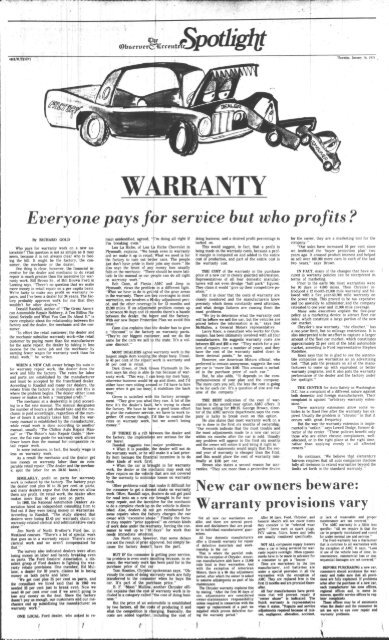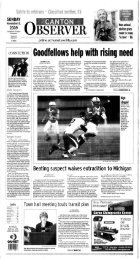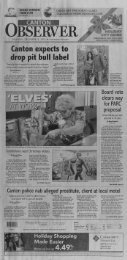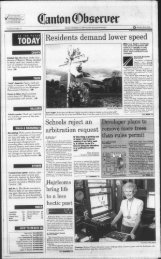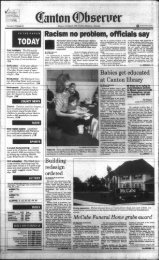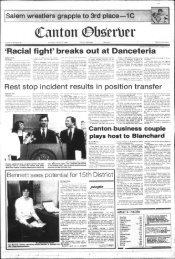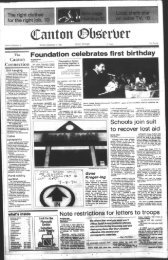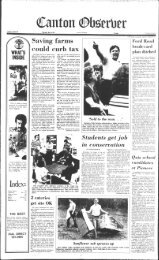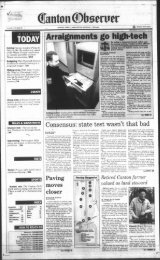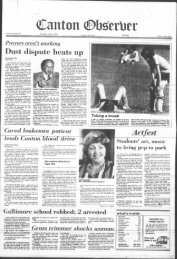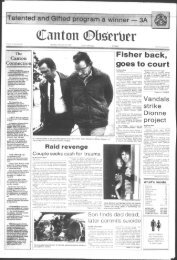L WV wants, c mmunity lobby - Canton Public Library
L WV wants, c mmunity lobby - Canton Public Library
L WV wants, c mmunity lobby - Canton Public Library
Create successful ePaper yourself
Turn your PDF publications into a flip-book with our unique Google optimized e-Paper software.
(ylisrrur<br />
rrrtitr<br />
Spotlight<br />
4b(b.w,t*10) ,<br />
fhuraday, January 16, 1975<br />
WARRANTY<br />
M .<br />
!<br />
Everyone pays for service but who profits ?<br />
By RICHARD GOLD<br />
Who pays for warranty work on a new automobile?<br />
This question is not as simple as it may<br />
seem, because it is not always clear who is footing<br />
the bill. It might be the factory, the consumer,<br />
the mechanic or the dealer.<br />
One thing is clear, however, the financial incentive<br />
for the dealer and mechanic to do retail<br />
repair is much greater than the incentive for warranty<br />
work. Bill Brown Sr., of Bill Brown Ford in<br />
Lansing says, "There's no question that we make<br />
more money in retail repair on a per capita basis.<br />
We're lucky to make any profit on warranty repairs,<br />
and I've been a dealer for 34 years. The factory<br />
probably approves work for me that they<br />
wouldn't for other dealers."<br />
Donald Randall, author of "The Great American<br />
Automobile Repair Robbery, A Ten Billion National<br />
Swindle and What You Can Do About It" is<br />
more emphatic about the relationship between the<br />
factory and the dealer, the mechanic and the consumer.<br />
"In effect the retail customer, the dealer and<br />
the mechanic subsidize warranty work—the retail<br />
customer by paying more than the manufacturer<br />
for the same repair, the dealer by taking in less<br />
income for the same job and the mechanic by<br />
earning fewer wages for warranty work than for<br />
retail work." he writes.<br />
WHEN A NEW CAR owner brings his auto in<br />
for warranty repair work, the dealer does the<br />
work and bills the factory. The rates for labor<br />
and parts are established by the manufacturer<br />
and must be accepted by the franchised dealer.<br />
According to Randall and many car dealers, the<br />
rebate from the factory is inadequate and this is<br />
where the problem begins. The dealer either loses<br />
money or makes at best a "marginal profit."<br />
The mechanic at a dealership is pdid according<br />
to a flat rate manual. The manual designates<br />
the number of hours a job should take and the mechanic<br />
is paid accordingly, regardless of the number<br />
of hours it actually takes him. But the warranty<br />
manual is established by the manufacturer,<br />
while retail work is done according to another<br />
manual, usually "The Chilton Auto Repair Manual"<br />
or "The Motor's Auto Repair Guide." However.<br />
the flat rate guide for warranty work allows<br />
fewer hours than the manual for comparable retail<br />
repair work<br />
In some instances, in fact, the hourly wage is<br />
less on warranty work.<br />
As a result the mechanic and the (jlealer get<br />
less money on warranty labor than on comparable<br />
retail repair. (The dealer and the mechanic<br />
split the labor fee on 50-50 basis.)<br />
SIMILARLY, profit on parts for warranty<br />
work is reduced by the factory. The factory pays<br />
the dealer cost plus 20 to 25 per cent on parts,<br />
and many dealers argue that this does not allow<br />
them any profit. On retail work, the dealer often<br />
makes more than 40 per cent on parts.<br />
In 1968, the National Automobile Dealers' Association<br />
hired an independent consulting firm to<br />
find out if they were losing money on warranties.<br />
According to Randall, "The study showed that<br />
dealers were losing $3.45 per warranty claim on<br />
warranty-related clerical and administrative costs<br />
alone "<br />
Jim North of North Brother's Ford Inc. in<br />
Westland concurs. 'There's a lot of special work<br />
that goes on in a warranty repair. There's extra<br />
clerical work and we aren't compensated for<br />
that."<br />
The survey also indicated dealers were often<br />
losing money on labor and barely breaking even<br />
on parts. The Ford Dealers' Association, a dissident<br />
group of Ford dealers is fighting the warranty<br />
rebate provisions. One member, Ed Mullane,<br />
a dealer for 20 years, claims he is losing<br />
money on both parts and labor.<br />
"We get cost plus 25 per cent on parts, and<br />
the consultant we hired said that in 1969 we<br />
needed 33 per cent just to break even. Now we<br />
need 40 per cent over cost if we arent going to<br />
loae any money on the deal. Since the factory<br />
doesnt pay us enough, our customers and our mechanics<br />
end up subsidizing the manufacturer on<br />
warranty work."<br />
ONE LOCAL Ford dealer, who asked to ref<br />
/<br />
main unidentified, agreed, "I'm doing all right if<br />
I'm breaking even."<br />
Lou La Riche, of Lou La Riche Chevrolet in<br />
Plymouth, explains, "We break even in warranty<br />
and we make it up in retail. What we need is for<br />
the factory to turn out better cars. The people<br />
just don't have pride in their jobs any more." He<br />
also says the brunt of any money loss usually<br />
falls on the mechanic. "There should be more latitude<br />
in the manual so our people can do all right<br />
on warranty work."<br />
Bob Cann, of Fiesta AMC and Jeep in<br />
Plymouth, views the problefri in a different light.<br />
"What we have to do is get rid of the gray areas<br />
in the warranty. There are tjwo coverages in most<br />
warranties, one involves a 90-day adjustment period,<br />
and the other coverage is for 12 months and<br />
12,000 miles. If an adjustment problem comes up<br />
in between 90 days and 12 months there's a hassle<br />
between the dealer, the buyer and the factory.<br />
With our new Buyer Protection Plan we avoid this<br />
issue."<br />
Cann also explains that pie dealer has to give<br />
a "discount" to the factorv on warranty parts.<br />
•They're our biggest customer, and we do the<br />
same for the cars we sell to the state. It's a volume<br />
discount."<br />
MOST DEALERS agree warranty work is the<br />
largest single item keeping the shops busy. Usually<br />
40 per cent of the repair;work is warranty and<br />
60 per cent is retail.<br />
Dick Green, of Dick Gfeen Plymouth in Detroit<br />
says his shop is able tjo run because of warranty<br />
work. "This way, I cih keep my men busy,<br />
otherwise business would b4 up and down, and I'd<br />
either have men sitting around or I'd have to hire<br />
more when it got too busy* it stabilizes the back<br />
shop."<br />
Green is satisfied with his factory arrangement.<br />
"They give you what they can. A lot of the<br />
time it's the dealer's fault, he's trying to cheat<br />
the factory. We have to have a good team effort<br />
to give the customer service, we have to work together.<br />
Of course though, I'd like to control the<br />
rates on warranty work, but we aren't losing<br />
money."<br />
IF THERE IS a rift bitween the dealer and<br />
the factory, the implications are serious for the<br />
car buyer.<br />
Randall suggests two<br />
• When it is possible,<br />
the dealer will not do<br />
the warranty work, or he will make it a last priority<br />
item because the financial incentive is to do<br />
other kinds of work first<br />
• When the car is brought in for warranty<br />
work, the dealer or the mechanic may seek out<br />
other repairs on the vehicle that are not covered<br />
by the warranty to minimize losses on warranty<br />
woric.<br />
"Other problems exist that make it difficult for<br />
the consumer to get a decent shake on warranty<br />
work. Often, Randall says, dealers do not get paid<br />
for road tests on a new car brought in for warranty<br />
repair, and the incentive for the mechanic<br />
to do a complete check up an the vehicle is diminished.<br />
Also, dealers do<br />
some repairs when the f<br />
owner with "excessive a<br />
ry may require "prior app<br />
of work done under the wa<br />
BUT IF the consumer lis getting poor service,<br />
his problem is even more insulting because, in essence,<br />
the warranty work hjas been paid for in the<br />
purchase price of the car.<br />
Tom Houston, Chrysler spokesman says, "Obviously<br />
the costs of doing warranty work are fully<br />
transferred to the consurrjer when he buys the<br />
car. It's part of the purchase price."<br />
B. F. "Moon" Mullins,; another Chrysler official<br />
explains that the cost of warranty work is included<br />
in a category called "the cost of doing business."<br />
But the price of an automobile is established<br />
by two factors, all the coats of producing it and<br />
what the competition is charging. Basically, the<br />
costs are added together, including the cost of<br />
f<br />
major problems:<br />
t get reimbursed for<br />
tory charges the car<br />
e." Finally the factoval"<br />
on certain kinds<br />
anty, forcing the con-<br />
sumer to wait up to j"10 days" for work that<br />
needs immediate attention.<br />
Jim North says, however, that some delays<br />
are not the result of prior approval, but simply because<br />
the factory doesn't have the part.<br />
doing business, and a desired profit percentage is<br />
tacked on.<br />
This would suggest, in fact, that a profit is<br />
being made on the warranty costs, because a profit<br />
margin is computed on and added to the entire<br />
cost of production, and part of the entire cost is<br />
the warranty cost.<br />
THE COST of the warranty in the purchase<br />
price of a new car is closely guarded information.<br />
Representatives of all four domestic manufacturers<br />
will not even divulge "ball park" figures.<br />
They claim it would "give up their competitive position."<br />
But it is clear that the costs of warranty are<br />
closely monitored and the manufacturers know<br />
precisely which items constantly need attention,<br />
and what design failures are causing them the<br />
most problems.<br />
"We try to determine what the warranty cost<br />
will be b&ore we sell the car, but the vehicles are<br />
priced before the information is in," says Bud<br />
McMullen, a General Motors representative.<br />
Larry Knox, a consultant who works for Cummunico,<br />
has been intimately involved with all four<br />
manufacturers. He suggests warranty costs are<br />
between $25 and $50 a car. "They watch for a pattern<br />
of repairs over a number of years, and they<br />
have the cost of the warranty nailed down to<br />
three decimal points," he says.<br />
However, one American Motors official, who<br />
preferred to remain anonymous, suggests the cost<br />
per car is "more like $100. This amount is included<br />
in the purchase price of each car."<br />
But, he also adds, "It depends on the comprehensiveness<br />
of your plan and the company.<br />
TTie more cars you sell, the less the cost is going<br />
to be for each car. It's a question of size and volume<br />
of the company."<br />
THE BEST indication of the cost of warranties<br />
is the second year option AMC offers. It<br />
has been selling for $99.95. George Brown, director<br />
of the AMC service department,says the company<br />
is lucky to break even on this option.<br />
He also states that most warranty work or. a<br />
car is done in the first six months of ownership.<br />
"Our records indicate that the most trouble and<br />
the most adjustments made to a new car occur<br />
within six months after the car is sold. Usually<br />
any problem will appear in the first six months<br />
and the owner will notice it and bring it right in."<br />
Brown's statements would imply that the second<br />
year of warranty is cheaper than the first,<br />
and this would place the cost of warranty minimally<br />
at $100 per car.<br />
Brown also states a second reason for warranties.<br />
"They are more than a protective device<br />
for the owner, they are a marketing tool for the<br />
company."<br />
"Our sales have increased 50 per cent since<br />
we instituted the 'buyer protection plan' two<br />
years ago. It aroused product interest and helped<br />
us sell over 100,000 more cars in each of the last<br />
two years," says Brown<br />
IN FACT, many of the changes that have occured<br />
in warranty policies can be interpreted in.<br />
terms of marketing.<br />
Prior to the early '60s most warranties were<br />
for 90 days or 4,000 miles. Then Chrysler introduced<br />
a 12 month-12,000 mile warranty and followed<br />
with a five year-50,000 mile warranty on<br />
the power train. This proved to be too expensive<br />
and too unwieldy to administer, and the company<br />
retreated to one year and 12,000 mile coverage.<br />
Many auto executives explain the five-year<br />
policy as a marketing device to attract fleet car<br />
sales, which constitute a large portion of the new<br />
car market.<br />
Chrysler's new warranty, "the clincher," has<br />
a one-year limit, but no mileage restrictions It is<br />
also interpreted to be an effort to capture a larger<br />
amount of the fleet car market, which constitutes<br />
approximately 25 per cent of the total automobile<br />
market, according to Ford representative Stephen<br />
Madeline.<br />
Knox says that he is glad to see the automobile<br />
companies use warranties as an advertising<br />
tool. "That puts the pressure on all of the manufacturers<br />
to come up with equivalent or better<br />
warranty programs, and it also puts the warranty<br />
performance of the dealer and the factory under<br />
the spotlight "<br />
THE CENTER for Auto Safety in Washington<br />
D C. has a complaint of a different nature against<br />
both domestic and foreign manufacturers. Their<br />
complaint is against "arbitrary warranty extensions."<br />
,<br />
These warranty extensions allow some vehicles<br />
to be fixed free after the warranty has expired.<br />
Usually the problem is "chronic" in that it<br />
occurs with great frequency.<br />
But the way the warranty extension is implemented<br />
is "unfair," says Lowell Dodge, former director<br />
of the center. "These policies benefit only<br />
those who are either chronic complainers, welleducated,<br />
or in the right place at the right time,<br />
rather than applying evenly to all affected<br />
owners."<br />
He continues, "We believe that elementary<br />
fairness requires that all auto companies disclose<br />
fully all decisions to extend warranties beyond the<br />
limits set forth in the standard warranty."<br />
New car owners beware:<br />
Warranty provisions vary<br />
Not all new car warranties are<br />
alike, and there are several provisions<br />
and disclaimers that are peculiar<br />
to individual manufacturers', guarantees.<br />
All four domestic manufacturers<br />
offer a 12-month warranty for repair<br />
of defective materials and workmanship<br />
in the car.<br />
That is where the parellel ends.<br />
With the exception of Chrysler, American<br />
manufacturers alsb have a 12,000<br />
mile limit in their warranties. And<br />
with the exception of American<br />
Motors, there is a 90- day adjustment<br />
period, after which the owner is asked<br />
to assume adjustments as part of his<br />
maintenance.<br />
The Chrysler warranty explains this<br />
by stating, "After the first 90 days of<br />
use, adjustments are considered<br />
owner-maintenance responsibility<br />
unless required in connection with the<br />
repair oj replacement of a part we<br />
supplied which proves defective during<br />
the warranty period."<br />
After 90 days. Ford, Chrysler, and<br />
General Motors will not cover items<br />
they consider to be "selected wear<br />
parts." Items such as spark plugs,<br />
PCV valves, filters, hoses and belts<br />
are usually mentioned specifically.<br />
NOT ALL companies supply loaners<br />
when a car is being serviced for warranty<br />
repairs overnight. Often appointments<br />
have to be made in advance for<br />
a consumer to get a "loaner."<br />
Tires are warranteed by the tire<br />
manufacturer, and batteries are<br />
under a special provision in all the<br />
warranties with the exception of<br />
AMC. They are replaced free in the<br />
first 12 months and are prorated thereafter.<br />
All four manufacturers have provisions<br />
that will prevent repair if<br />
"owner abuse" is indicated. The<br />
Bulck warranty is representative<br />
when it states, "Repairs and service<br />
adjustments required because of misuse,<br />
negligence, alteration, accident,<br />
or lack of reasonable and proper<br />
maintenance are not covered."<br />
The AMC warranty is a little less<br />
specific: "All we require that the<br />
car be properly maintained and cared<br />
for under normal use and service."<br />
rhe Ford warranty has a disclaimer<br />
that is common to all warranties with<br />
the exception of AMC. It says, "Loss<br />
of use of the vehicle loss of time, inconvenience,<br />
commercial loss or consequential<br />
damages are not covered."<br />
BEFORE PURCHASING a new car,<br />
consumers should scrutinize the warranty<br />
and make sure that all provisions<br />
are fully explained. If problems<br />
arise after the purchase of a new car,<br />
each maiyifacturer has zone offices,<br />
regional offices and, in some instances,<br />
specific service offices to register<br />
complaints.<br />
These offices may be of assistance<br />
when the dealer and the consumer do<br />
not see eye to eye over repair and<br />
warranty problems.<br />
!


